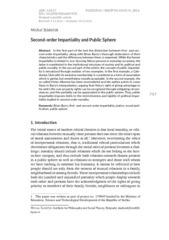Приказ основних података о документу
Second-order Impartiality and Public Sphere
Nepristrasnost drugog reda i javna sfera
| dc.creator | Sládeček, Michal | |
| dc.date.accessioned | 2018-03-17T10:00:26Z | |
| dc.date.available | 2018-03-17T10:00:26Z | |
| dc.date.issued | 2016 | |
| dc.identifier.issn | 0353-5738 (Print) | |
| dc.identifier.issn | 2334-8577 (Online) | |
| dc.identifier.uri | http://rifdt.instifdt.bg.ac.rs/123456789/1469 | |
| dc.description.abstract | In the first part of the text the distinction between first- and second-order impartiality, along with Brian Barry’s thorough elaboration of their characteristics and the differences between them, is examined. While the former impartiality is related to non-favoring fellow-persons in everyday occasions, the latter is manifested in the institutional structure of society and its political and public morality. In the second part of the article, the concept of public impartiality is introduced through analysis of two examples. In the first example, a Caledonian Club with its exclusive membership is considered as a form of association which is partial, but nevertheless morally acceptable. In the second example, the so-called Heinz dilemma has been reconsidered and the author points to some flaws in Barry’s interpretation, arguing that Heinz’s right of giving advantage to his wife’s life over property rights can be recognized through mitigating circumstances,and this partiality can be appreciated in the public sphere. Thus, public impartiality imposes limits to the restrictiveness and rigidity of political impartiality implied in second-order morality. | en |
| dc.description.abstract | Prvi deo teksta razmatra distinkciju između nepristrasnosti prvog i drugog reda, zajedno sa Berijevom (Brian Barry) temeljnom elaboracijom karakteristika i razlika ovih nepristrasnosti. Dok se nepristrasnost prvog reda odnosi na nefavorizovanje bliskih osoba u svakodnevnim odnosima, nepristrasnost drugog reda se ispoljava u institucionalnoj strukturi društva i njenom javnom i političkom moralitetu. U drugom delu članka uvodi se pojam javne nepristrasnosti kroz analizu dva primera. Prvi primer jeste Kaledonijski klub sa svojim ekskluzivitetom članstva i razmatra se kao oblik udruženja koje je pristrasno, ali je ipak moralno prihvatljivo. Drugi primer predstavlja takozvana Hajncova dilema, pri čemu autor daje svoju reinterpretaciju slučaja i ukazuje na pojedine slabe tačke Berijevog tumačenja, smatrajući da se kroz postojanje olakšavajućih okolnosti može prihvatiti Hajncovo pravo da daje prednost svojoj supruzi u odnosu na prava vlasništva i da ova pristrasnost može biti prihvaćena u javnoj sferi. Na taj način javna nepristrasnost određuje granice restriktivnosti i rigidnosti političke nepristrasnosti koja je implicirana u nepristrasnosti prvog reda. | sr |
| dc.language.iso | sr | sr |
| dc.relation | info:eu-repo/grantAgreement/MESTD/Basic Research (BR or ON)/179049/RS// | sr |
| dc.rights | openAccess | sr |
| dc.rights.uri | https://creativecommons.org/licenses/by-nc-nd/4.0/ | |
| dc.source | Filozofija i društvo/Philosophy and Society | sr |
| dc.subject | Brian Barry | sr |
| dc.subject | Brajan Beri | sr |
| dc.subject | first and second-order impartiality | sr |
| dc.subject | justice | sr |
| dc.subject | moral justification | sr |
| dc.subject | public sphere | sr |
| dc.subject | nepristrasnost prvog i drugog reda | sr |
| dc.subject | moralno opravdanje | sr |
| dc.subject | pravda | sr |
| dc.subject | javna sfera | sr |
| dc.title | Second-order Impartiality and Public Sphere | en |
| dc.title | Nepristrasnost drugog reda i javna sfera | sr |
| dc.type | article | sr |
| dc.rights.license | BY-NC-ND | sr |
| dcterms.abstract | Сладечек, Мицхал; | |
| dc.citation.issue | 4 | |
| dc.citation.volume | 27 | |
| dc.citation.spage | 757 | |
| dc.citation.epage | 771 | |
| dc.identifier.doi | 10.2298/FID1604757S | |
| dc.type.version | publishedVersion | sr |
| dc.identifier.fulltext | http://rifdt.instifdt.bg.ac.rs/bitstream/id/2920/bitstream_2920.pdf | |
| dc.identifier.wos | 000408374000005 |

